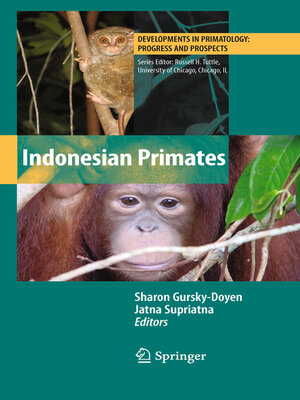Indonesian Primates
ebook ∣ Developments in Primatology: Progress and Prospects
By Sharon Gursky-Doyen

Sign up to save your library
With an OverDrive account, you can save your favorite libraries for at-a-glance information about availability. Find out more about OverDrive accounts.
Find this title in Libby, the library reading app by OverDrive.



Search for a digital library with this title
Title found at these libraries:
| Library Name | Distance |
|---|---|
| Loading... |
Indonesia possesses the second largest primate population in the world, with over 33 different primate species. Although Brazil possesses more primate species, Indonesia outranks it in terms of its diversity of primates, ranging from prosimians (slow lorises and tarsiers), to a multitude of Old World Monkey species (macaques, langurs, proboscis moneys) to lesser apes (siamangs, gibbons) and great apes (orangutans). The primates of Indonesia are distributed throughout the archipelago.
Partly in response to the number of primates distributed throughout the Indonesian archipelago, Indonesia is classified as the home of two biodiversity hotspots (Wallacea and Sundaland). In order to be classified as a hotspot, an area must have a large proportion of endemic species coupled with a high degree of threat including having lost more than 70% of its original habitat. Two areas within Indonesia meet these criteria. The tremendous diversity of primates in Indonesia, in conjunction with the conservation issues facing the primates of this region, created a need for this volume.







